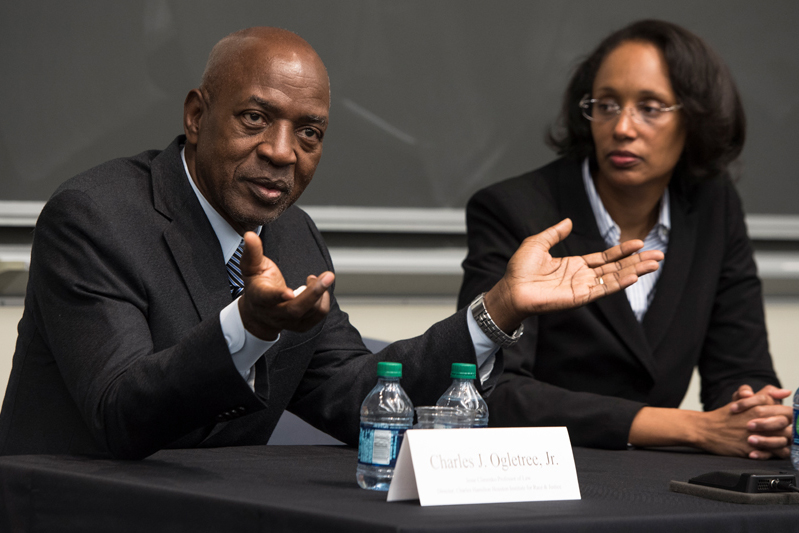Despite the strides that society has made over the past half century toward more equitable opportunities for the disadvantaged, there are still areas of institutional inequality, including public education, that require activism from the legal community, said two experts at a talk at BC Law Nov. 14.
Charles J. Ogletree Jr. and Kimberly Robinson, both scholars of educational discrimination law and veterans in the fight for equality, were on campus to discuss their book, The Enduring Legacy of Rodriguez: Creating New Pathways to Equal Educational Opportunity. They emphasized the vital importance of federal involvement in crafting educational standards and providing adequate funding to school reformers, a role that heretofore has not been properly filled, they said, to the detriment of generations of American schoolchildren and families.
“We’ve traveled around the country and our goal is to make folks understand the importance of equal educational opportunities for all Americans, not only those communities that stand to benefit most,” said Ogletree, Harvard’s Jesse Climenko Professor of Law and director of the Charles Hamilton Houston Institute for Race and Justice. “And in part, our book is a reflection of those experiences.”
The central event of the book is the 1973 Supreme Court case San Antonio Independent School District v. Rodriguez. The primary issue was whether the Constitution protected an affirmative fundamental right to education, said Robinson, a professor at the University of Richmond School of Law. If the Constitution did protect that right, she explained, “it would be the federal government’s duty to take a leading, active role in its promotion.”
The central allegation in the case was that disparities in funding for the school district, and the lower funding it was receiving, violated the Constitution, particularly the Equal Protection Clause, which would open the door for federal remedies to address the disparities. The court’s 5-4 decision that there was not a fundamental educational right in the Constitution, Robinson said, “effectively closed the doors of the federal courthouse to plaintiffs seeking remedies for educational inequalities, and since then reformers have had to fight in the state courts.”
However, Professors Ogletree and Robinson argued, state educational reform has not been effective enough in alleviating educational inequalities and clearly indicate the necessity to rethink the Rodriguez decision about the federal government’s role.
“Though many times the state courts rule in favor of plaintiffs, the state legislatures are powerful enough to often resist the mandate of the courts,” Robinson said. “And so progress is only made gradually, and moderately, which means that we as a society have accepted that only some students are given access to great schools while other students have to make do with sub-par schools, often for generations.”
Since the federal government, through laws like the No Child Left Behind Act, has taken a significant interest in educational policy, the authors believe that “now is the time to rethink the Rodriguez decision and consider a paradigm shift in the way we perceive educational federalism.” They called for more uniform federal funding, involvement, and progress toward construing an affirmative right to education in the Constitution itself.
Photograph by Jessie Holloman, MTS, BC


